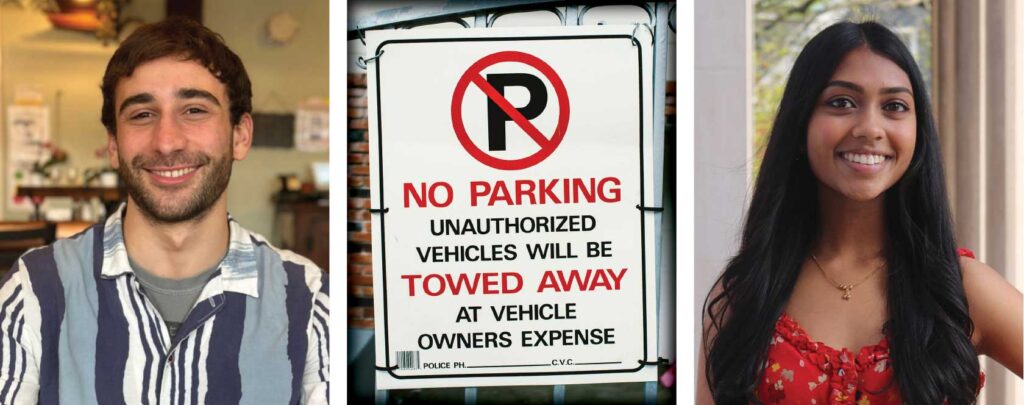Say toodles to towing: text alert service wants to help residents avoid towing

In the fall of 2022, Eli Silvert, 26, began to notice something worrisome. Parking rules in Boston, which had become somewhat lax during the pandemic when the city temporarily halted street cleaning, began to be enforced again.
In the two years he had been living in Boston beginning in the summer of 2020, Silvert’s car had been towed six to eight times for street cleaning or other reasons, costing him a whopping $1,000 in fees. And it wasn’t just him. The rules slipped the minds of his neighbors, too. Some days, Silvert noticed whole rows of cars lining the roads of his Brighton neighborhood on street cleaning mornings.
He became concerned with “the issue of there being a lot of parking rules that were very stringently enforced and there not … all that much effort going towards helping people correct their actions,” he said.
One morning, when Silvert witnessed a string of tow trucks at the ready on his street, with his car next in line, he leaped into action to solve the problem. He decided he would text his neighbors reminders about street cleanings.
Silvert began distributing flyers on his block asking his neighbors for their license plates and phone numbers so that once a week, he could send out a reminder the night before a scheduled street cleaning. The morning of the street cleaning, he would walk around the block, take note of cars that were still parked illegally and text their owners a warning.
A few months later, Silvert, a data scientist, began working with engineer Mihika Nadig, 25, to expand and streamline the process. The result was Tow Zone Alerts, a free texting service that does what Silvert had been doing, just automatically and on a larger scale.
The goal of the service, Silvert said, is to prevent neighbors from being towed and to save them time and money.
The text-based app, which debuted in April 2023, allows residents in Boston, Cambridge and Somerville to sign up to receive notifications about upcoming street cleanings, and lets residents notify their neighbors who are parked illegally. In addition, if a street parking spot has been temporarily reserved for, say, a moving truck, Tow Zone Alerts will also notify residents living within 100 feet of the location.
A year and a half since the launch and 2,000 subscribers later, Silvert said Tow Zone Alerts has been successful.
“It hasn’t hurt by any means, and it certainly saved some people from getting towed,” he said. “We’ve gotten a lot of qualitative positive feedback about that.”
For his part, Silvert has not been towed recently because the street parking rules have been “top of mind,” he said, saving him hundreds of dollars.
Users of the texting service have reaped the benefits of this passion project, too. Although the average Tow Zone Alert subscriber has been using the app for approximately 200 days, the creators have data that demonstrate the efficacy of the service. An analysis they conducted showed that, on average, residents who signed up for the service reduced their chances of being towed by about 80%.
Most challenging for Silvert and Nadig has been Tow Zone Alerts’ peer-to-peer text alert offering. While neighbors have been diligent about texting in license plates of illegally parked cars, that feature only works if the vehicle’s owner is a Tow Zone Alerts subscriber. Silvert said there have been just 45 instances where a resident texted in a license plate and Tow Zone Alerts was able to alert the owner.
To improve the peer-to-peer offering, the creators are working on increasing the number of sign-ups. To get more people on board, they plan to introduce a referral program and gamify the service. This adjustment would incentivize users by offering rewards — such as a gift card to a local business or Tow Zone Alerts merch — to active residents.
Silvert said he also wants to expand to more cities and see Boston and other municipalities adopt the service to help reduce towing and parking tickets, especially in low-income neighborhoods where residents don’t have the disposable income to manage with such hurdles.
Currently, Tow Zone Alerts isn’t profitable. The company has secured a couple of sponsors and some grants from the city of Cambridge to cover its operating costs, but making money isn’t the goal anyway, Silvert said. He said he wants the service to remain free to residents and continue to foster “camaraderie.”
“I hope it ultimately saves people a lot of money, puts money back in their pocket, and saves them time and headache,” Silvert said. He added that he hopes to continue to “bring neighbors together to do something productive and helpful in the name of not getting towed and not getting overly punished for what’s oftentimes just a mindless mistake.”
Residents can sign up for Tow Zone Alerts on the company’s website.






